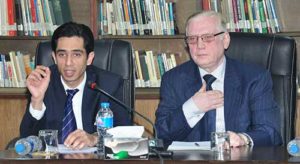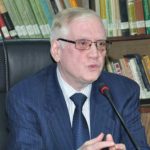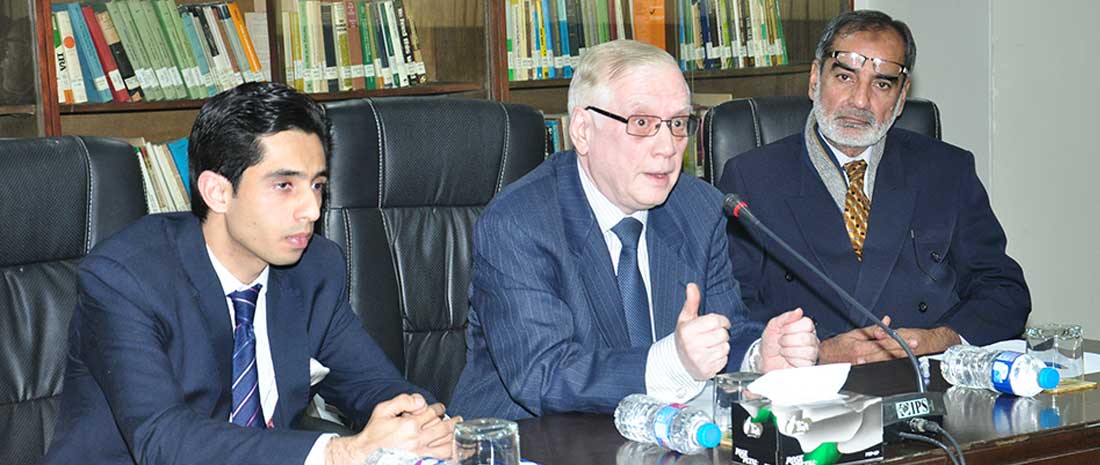‘UN resolutions on Kashmir: An insight’
Kashmir issue must be resolved in accordance with UN Security Council resolutions
Terming Kashmir issue as one of the oldest disputes in UN whose fate still hangs in jeopardy even after 70 years, the speakers at a session held at IPS urged the global body to play a more eloquent role in resolving the matter in line with its self-discerned solution.
Held on January 23, 2018, the session ‘UN resolutions on Kashmir: An insight’ was chaired by Ambassador (r) Tajammul Altaf, and addressed by DG-IPS Khalid Rahman and Muhammad Abdul Qadeer, research associate, Strategic Studies Institute Islamabad (SSII).
 Presenting his understanding of the matter, Qadeer shared that according to the UNSC resolution of 1948, the fate of Kashmir was to be decided over UN-supervised plebiscite. Soon after the resolution, the conditions for holding a plebiscite were also laid. The implementation of the resolution however has been lingering ever-since as India has consistently found ways for its delay.
Presenting his understanding of the matter, Qadeer shared that according to the UNSC resolution of 1948, the fate of Kashmir was to be decided over UN-supervised plebiscite. Soon after the resolution, the conditions for holding a plebiscite were also laid. The implementation of the resolution however has been lingering ever-since as India has consistently found ways for its delay.
He said that at first India blamed Pakistan for not fulfilling the UN’s plebiscite precondition of demilitarizing the region, maintaining that India had to withdraw the ‘bulk of its forces’ once the UN Commission confirms that Pakistani troops had first been withdrawn. But since Pakistan did not fulfil its part of the equation, the needed conditions for holding the UN supervised plebiscite were never met.
The speaker however argued that the Indian argument did not rest with the real principles of plebiscite as determined by the United Nations Commission for India and Pakistan (UNCIP) Resolution of August 13, 1948. In October 1967, Dr Frank P Graham – a UN mediator in Kashmir – submitted a detailed report over the matter noting that the requirement for the withdrawal of all Pakistani forces was related to the required withdrawal of bulk of Indian forces in stages which was to be agreed upon by India and the UN Commission. The failure in reaching the said agreement however led to the currently longstanding demilitarization deadlock between India and Pakistan.
Qadeer also pointed that the said report diverged from the Indian account as well stating that both Pakistan and India did make ‘some withdrawals of forces’ from Kashmir; Pakistan however eventually refused to withdraw the remaining forces until India reaches an agreement with the UN Commission as provided in Part II of the 1948 resolution.
In 1950s, he additionally detailed, the Indian government also renounced plebiscite calling the UN resolution non-binding as it was made under the Section 6; and started calling Kashmir as its integral part. Now since 9/11, the country has also baselessly associated Kashmir issue with terrorism in an attempt to derail the UN-advised solution further.
Suggesting the way forward, the young researcher said that Pakistan’s narrative in response of the present Indian claims should detach the Kashmir’s freedom struggle from terrorism while emphasizing on their right of self-determination, which is very much in-line with international and humanitarian laws. The international law, he said, identifies certain combatants as freedom fighters and most of those conditions are fulfilled in case of Kashmiri struggle.
 Ambassador (r) Tajammul Altaf presented his insight over the matter stating that India took the issue to UN Security Council in 1948 but the move instead proved a blessing in disguise for Pakistan. Where India portrayed the matter as a territorial issue, Pakistan stressed that it was rather about the right of self-determination of the people of Kashmir. Pakistan’s viewpoint was later endorsed in the UN’s resolution that declared Kashmir as a disputed territory whose future should be decided through plebiscite.
Ambassador (r) Tajammul Altaf presented his insight over the matter stating that India took the issue to UN Security Council in 1948 but the move instead proved a blessing in disguise for Pakistan. Where India portrayed the matter as a territorial issue, Pakistan stressed that it was rather about the right of self-determination of the people of Kashmir. Pakistan’s viewpoint was later endorsed in the UN’s resolution that declared Kashmir as a disputed territory whose future should be decided through plebiscite.
The former ambassador said that while Pakistan accepted the UN’s resolution, India termed it non-binding and made attempts to get Pakistan excluded from the equation. However, when this tactic did not bore fruit, it tried to bypass the UN resolution by calling the dispute a bilateral issue and not an international one.
The speaker, in the end of his speech, stressed that Pakistan should continue to push for sustainable meaningful dialogues with India over the matter in a bid to find the issue’s much-needed speedy resolve.
Speaking over the issue, DG-IPS Khalid Rahman presented five points that should be part of Pakistan’s strategy in this regards:
- Kashmir is an unresolved issue and the existence of UN observers at LoC verify this claim. India hence should accept this reality instead of trying to make it look ambiguous by raising petty issues.
- The nature of dispute should be made very clear. While India calls it a territorial issue, to Pakistan it’s a humanitarian issue where the population of 1.3 crore is being denied the right of their self-determination.
- All the freedom struggle in Indian-occupied Kashmir is fundamentally indigenous with their 5th generation now fighting the war. Pakistan on the other hand is also an undetachable party to the dispute.
- After the passing of resolution, UN now is also a party to the issue; and even without the resolution, it is its job to resolve such disputes, and
- The continued human rights violations in Indian held Kashmir must be addressed as a matter of priority.
The speaker also said that while India keeps trying to distract Pakistan and the world by highlighting peripheral and petty issues, Pakistan should continue to make sustained efforts for the cause while ensuring national consensus that the country’s stance on Kashmir issue is based on truths, facts and ground realities.












